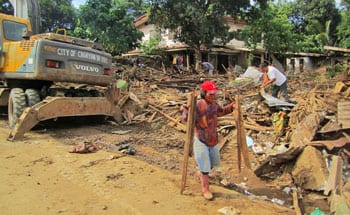It was a disaster waiting to happen. Living on the edge of riverbanks, families displaced by Washi (local name: Sendong) today had once fled their homes in 2009 at the height of a storm. With no alternative relocation then, they had gone right back, holding on to their proximity to the city and the assurance of livelihood.
Cagayan de Oro City, Philippines (20 December 2011) – It was a disaster waiting to happen. Living on the edge of riverbanks, families displaced by Washi (local name: Sendong) today had once fled their homes in 2009 at the height of a storm. With no alternative relocation then, they had gone right back, holding on to their proximity to the city and the assurance of livelihood.
 |
| Flash floods caused by Typhoon Washi have badly affected the southern island of Mindanao in the Philippines. |
International aid agency Oxfam calls on President Benigno Aquino III as he visits Cagayan de Oro City today to work out with the local government safe permanent relocation sites for residents living on vulnerable areas.
“The relocation process should respect and promote the rights of the residents affected. Communities should be consulted and be made part of dialogues with government agencies, and the relocation areas should have basic services in place, with access to livelihood options,” said Snehal Soneji, country director for Oxfam. In 2009, the Department of Environment and Natural Resources (DENR) had made a recommendation for families living close to the city’s water systems to be permanently relocated.
“The Philippines is highly vulnerable to natural disasters like typhoons, sea storm surges and tsunamis. People living in vulnerable areas – for example, housing projects that are almost built at sea level – would be courting further disaster,” said Soneji.
Violeta Rentuma, a 51 year-old resident of Macasandig village, is open to relocation. Damaged in 2009, her home, which was made of light materials, has been completely washed out by Washi. She cannot imagine rebuilding her and her family’s life, including three grandchildren she raises by selling food, back where a storm can erase it in one quick sweep.
According to Soneji, Washi highlights the need to empower local governments and communities to prepare for disaster. “The National Risk Reduction and Management Act was passed in 2009 to ensure that the government goes beyond emergency response and must instead reduce the risks to disasters and beef up preparedness, which includes early warning systems, relocation measures, hazards mapping, and sustainable land use plans. This law mandates that local governments set up a Disaster Risk Reduction Management (DRRM) Office and a DRRM plan to better face disasters,” said Soneji.
“But to be effective, much needed resources should be provided. Government can start by allocating the 1 billion fund for the National Disaster Risk Reduction Management Council (NDRRMC) as mandated by law. Aquino must also prioritize the passage of the People’s Survival Fund (PSF), a special trust fund that can be directly accessed by local government units and affected communities that are being and will be hit hard by climate change, now pending in the House of Representatives,” said Soneji.



